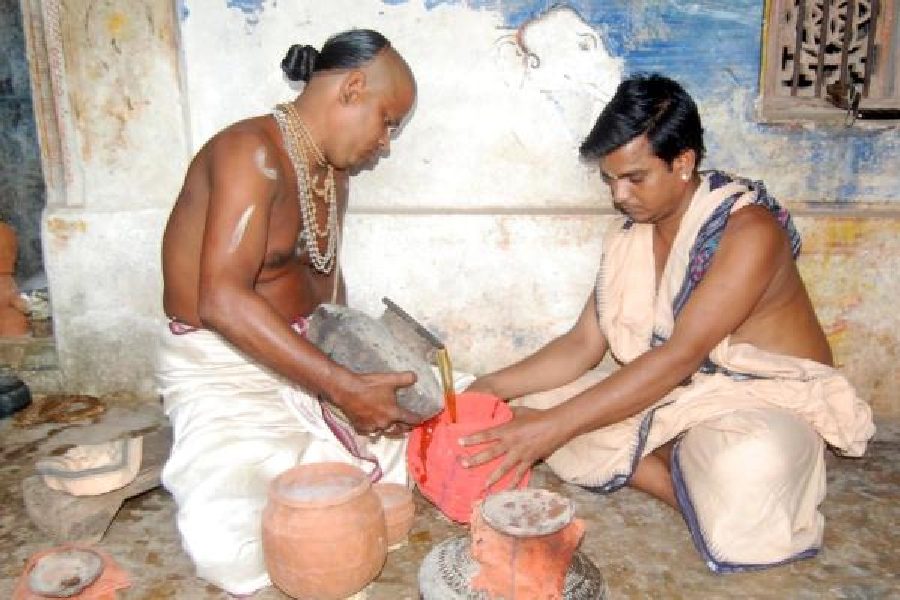An ayurvedic mode of treatment, specifically known as rejuvenation therapy, is taking place during the ongoing rituals of Lord Jagannath of Puri and his siblings who have fallen sick as per tradition after a lavish bath with 108 pots of specially scented water on Deba Snana Purnima on Saturday.
Suffering from fever and cold, the deities are in hibernation and are being treated specially by a chosen sect of servitors known as the “daitapatis.”
“It’s a gupta seva (a secret service). He is the living deity. Like any human being, He also faces death and takes birth during Naba Kalabera (change of idols), which occurs either every 12 years or 19 years. We treat Him as we do our family members when they suffer from fever or any disease,” said senior daitapati, Ramakrushna Dasmohapatra.
Decoding the treatment, retired professor of Puri Ayurveda College Vaidya Deba Prasad Dash explained, “The entire treatment is based on the principle of ‘Age reversal—Rejuvenation Rasayana Therapy.’ When treating an elderly person, we follow the principles of Rasayana Shastra. The same treatment is being administered to Lord Jagannath of Puri.”
He continued, “While treating an older person with the aim of rejuvenation, we ensure smooth blood flow in the arteries and veins, and optimal oxygen inhalation and exhalation. For this, we massage the body with oil infused with various medicines. Additionally, we provide medicines to increase stamina."
Vaidya Dash stated, “Similar methods are used for the deities. After the deities are taken out of the temple to the Snana Mandap (bathing mandap) on a Pahandi (procession) and bathed with 108 pitchers of water, the wooden idols suffer damage, wear and tear. A worn-out idol cannot be worshipped. Thus they undergo this rejuvenation therapy. A special massage is given with Phulluri oil mixed with different kinds of scented powder which creates a kind of aphrodisiac when applied to the body. It acts as an antibiotic and keeps the wood safe from any fungal attack."
This special oil used during the hibernation of the ailing deities is prepared on Hera Panchami—the fifth day of the Rath Yatra festival. This oil is also stored and used during the following year's ritual.
A wide range of natural elements, mainly flowers such as kia-ketaki, malati, baula, champa, as well as barks and roots like bena chera, sesame oil, sandalwood powder, camphor, different grains and other ingredients are used during the preparation of the Phulluri oil and the medicated paste. This preparation is done by the Bada Odia Matha and the Sudha Suara family.
The Phulluri oil will be applied on the deities on Thursday.
Besides Phulluri oil, the deities are also offered doses of herbs and roots including Dasamula modaka, which is believed to have strong medicinal properties. “It’s a kind of herbal medicine that we also give to patients to rejuvenate them. It acts as an antibacterial agent. Dasamula Rasayanam, which contains the ten roots, helps balance 'vata and kapha doshas', supports the respiratory system by reducing excess mucus, helps lower inflammation in joints and supports healthy muscles and nerves.”
Like every year, the Baidya Ratna Maguni Bramha family prepares the Dasamula modaka for the treatment. “This is an Ayurvedic medicine offered to the deities on the tenth day after Deba Snana Purnima. We use ten ayurvedic roots of medicinal plants,” Vaidya Sudhanshu Prasad Mishra told The Telegraph.
“The healers prepare the medicine by cutting and drying the barks and roots in the sun, then heating them with ghee, honey, sugar, camphor and many other things used to to prepare the Dasamula modaka. It is a very powerful medicine, even for humans. It is offered to deities, all of whom are unwell,” Vaidya Mishra said.











